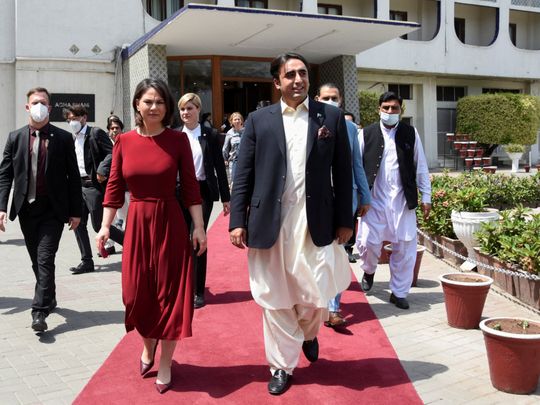
Islamabad: Foreign ministers of Pakistan and Germany discussed enhancing cooperation in trade and investment, climate change, and renewable energy on Tuesday. Afghanistan and the Russian-Ukraine conflict were also among the key topics of discussion.
Foreign Minister Bilawal Bhutto Zardari held wide-ranging consultations with his German counterpart Annalena Baerbock who arrived in Islamabad on June 7. However, Germany’s foreign minister had to cut short her three-country foreign trip after testing positive for COVID-19 in Pakistan. Baerbock had planned to stay in Pakistan until Wednesday and then visit Greece and Turkey.
Energy and climate partnership
In Pakistan, Baerbock said that her country wants to build on joint climate and energy partnership and move forward with energy transition and “lift bilateral climate cooperation to the next level.” She also said that the two sides agreed to increase trade and investment, particularly in the field of renewable energy. Pakistani foreign minister noted that Germany is Pakistan’s largest trading partner in the EU context and its fifth world export destination.
“Last year, Pakistan exports to Germany stood at $2.5 billion while imports from Germany remained at $1.3 billion,” he said. Germany is also the seventh-largest direct investor in Pakistan with 35 German companies investing in Pakistan with a total investment of $380 million.
Afghanistan issue
Pakistan’s neighbouring country Afghanistan was one of the main topics of discussion. In a joint press conference in Islamabad, the German foreign minister called on the international community to give a “loud and clear message” to the Afghan Taliban that “you are heading in the wrong direction.”
“The situation is dire and the Taliban are leading the country to a downfall. Parents do not know how to feed their children, girls are deprived of the right to education, women are almost excluded from participation in public life, and dissenting voices are brutally suppressed. The economy is rendering to a halt” she said, adding that as long as the Taliban go down this path, “there is no room for normalisation and even less for recognition of Taliban as legitimate rulers.” She reiterated that Germany would not abandon the people of Afghanistan and would continue to provide support.
Germany, which has welcomed almost 21,000 Afghans, considers Pakistan a key partner in the Afghanistan situation and discussed swift departure for those still remaining in Afghanistan. Lauding Pakistan’s role in peace and stability in Afghanistan, she said Pakistanis had shown ‘a big heart’ by welcoming millions of Afghans and providing them food, shelter and a chance for a better future.
“It is an enormous task that Pakistan is shouldering on behalf of the whole international community,” Baerbock said, offering support to the Afghan refugees and host communities in Pakistan.
Russia-Ukraine conflict
Discussing the Russia-Ukraine crisis, Foreign Minister Bilawal maintained that Pakistan “does not want to be dragged in conflict” but reiterated Pakistan’s official position which is an immediate cessation of hostilities and initiation of peaceful dialogue. He also said that Pakistan had also dispatched four planeloads of humanitarian aid for the people of Ukraine.
German foreign minister said that Russia’s war had set a dangerous precedent for the world and urged the global community to stand by Ukraine and defend its integrity with words and actions. She also underlined that the crisis is affecting the world economy. “Russia’s restriction on wheat export and siege of Ukrainian ports have sent food prices skyrocketing”.












